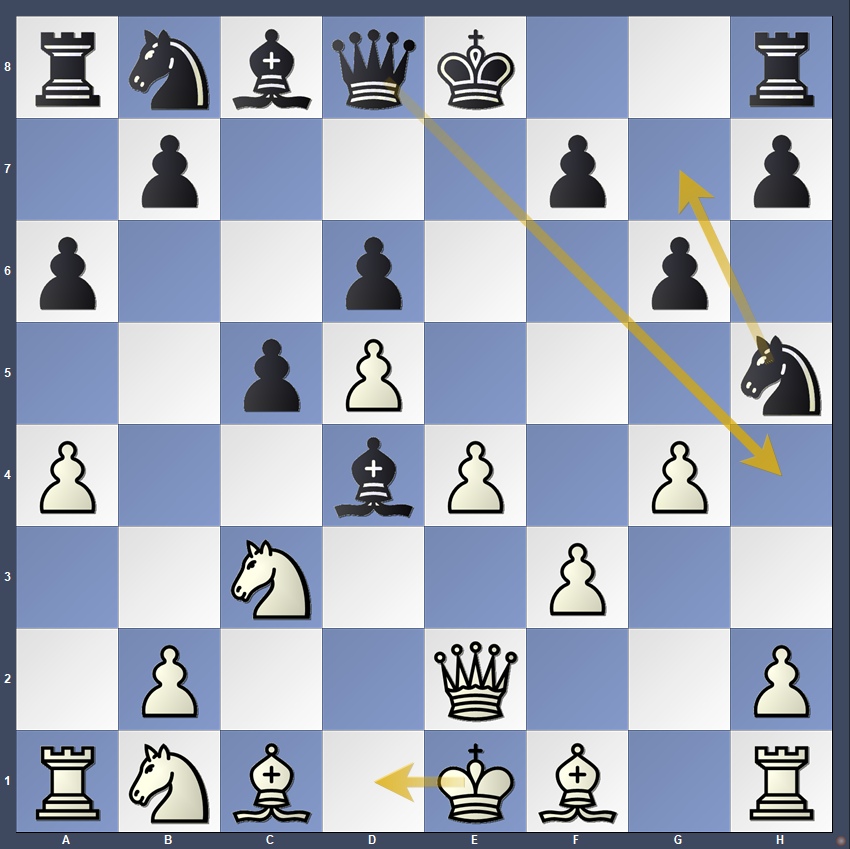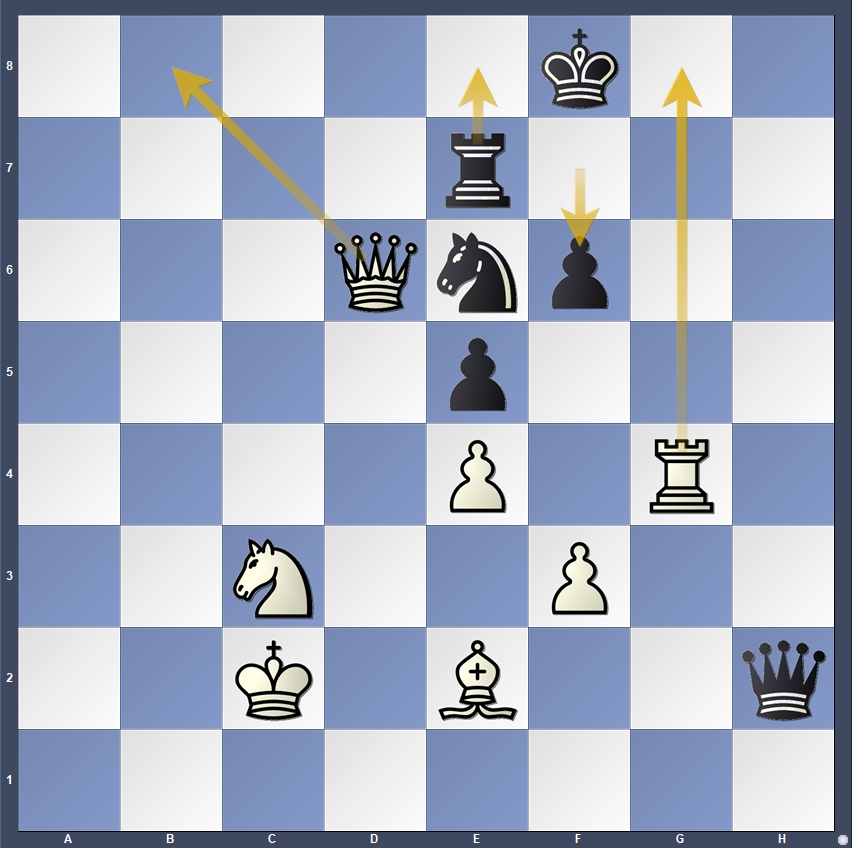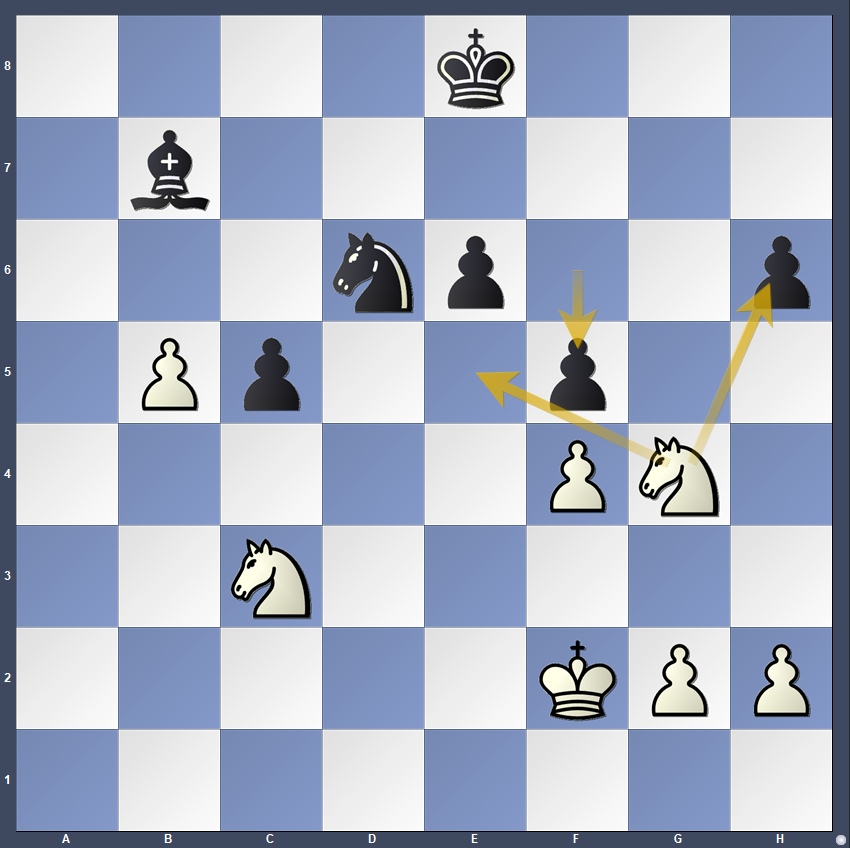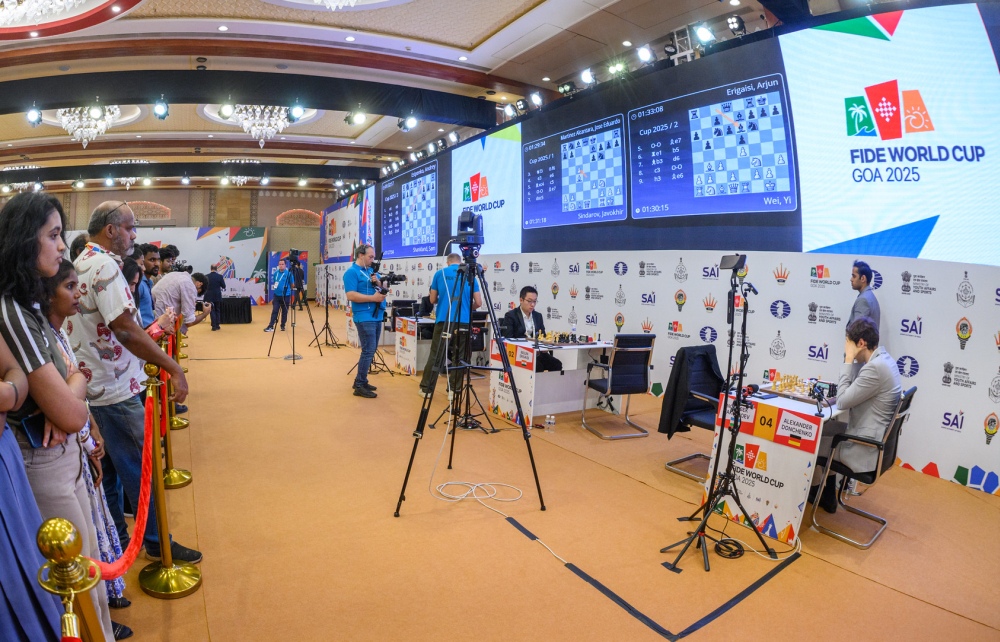
The quarterfinals have arrived at the FIDE World Cup 2025 in Goa, and the stakes could not be higher. Eight players remain, none of whom have qualified for the FIDE Candidates before. The field is a mix of seasoned super grandmasters and inspired underdogs, all of whom have battled tiebreaks on their journey here. Today, with no easy matchups and everyone hungry for a breakthrough, the questions were simple: Who would strike first? Who would hold their nerve?
Some players opted for safety from the start: Wei Yi vs Arjun Erigaisi saw lightning-fast preparation and 99% accuracy from both sides, ending in a draw within an hour. Whereas Nodirbek Yakubboev vs Alexander Donchenko saw a chaotic game, and the only decisive one of the day.
The atmosphere was calm but charged. The ceremonial first moves, 1.Nf3 d5, were played on Board 2 (Wei Yi vs. Arjun Erigaisi) by Shri Alok Kumar, IPS, Director-General of Police of Goa, and Gourav Rakshit, Global Chess League Commissioner.
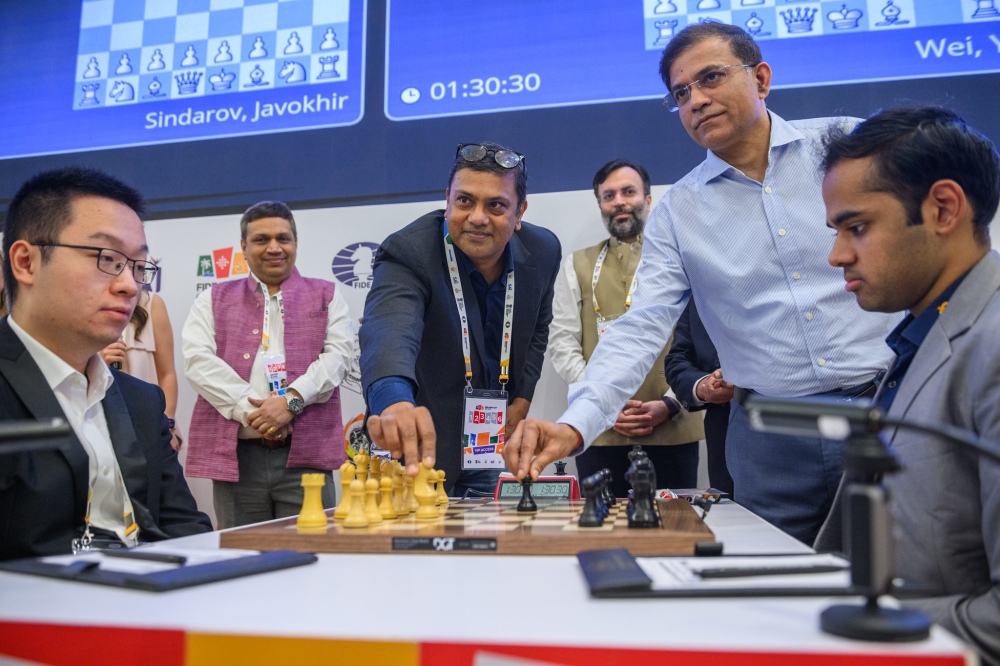
Quarterfinals Game 1 results:
- Javokhir Sindarov ½–½ José Eduardo Martínez Alcántara
- Wei Yi ½–½ Arjun Erigaisi
- Sam Shankland ½–½ Andrey Esipenko
- Nodirbek Yakubboev 1–0 Alexander Donchenko
Nodirbek Yakkuboev (2689) vs Alexander Donchenko (2641)
According to GM Peter Leko, this was “the game of the day,” and indeed, it could have gone in multiple directions. Nodirbek Yakubboev entered the round fresh, having not dropped a single game, but without facing a player rated above 2650. Alexander Donchenko, on the other hand, the lowest seed remaining, has been fighting giants all event, eliminating Candidates-qualifiers Anish Giri (2769) and Matthias Blübaum (2680), and surviving a nerve-wracking tiebreak against Lê Quang Liêm (2729).
When asked about his choice to play the Alekhine Anti-Grünfeld setup (1.d4 Nf6 2.c4 g6 3.f3), Yakubboev said he wanted a “complicated but solid central structure.” Early on, Donchenko overoressed instead of completing development.
In this early position, the safe retreat 11…Ng7 would have been best, but Donchenko went for the aggressive 11…Qh4? Black prevented White from castling but at unacceptably high price. White’s king found a safe heaven on c2, while Black’s pieces were awkwardly misplaced.
Things went from bad to worse for Doncheko as he had no active plan, while Yakubboev gradually improved his position and secured the decisive advantage by move 20. The final blow occurred right after the time control.
White finished off nicely with 42.Qb8+ Re8 43.Rg8+ Kxg8 44.Qxe8+ and Black resigned.
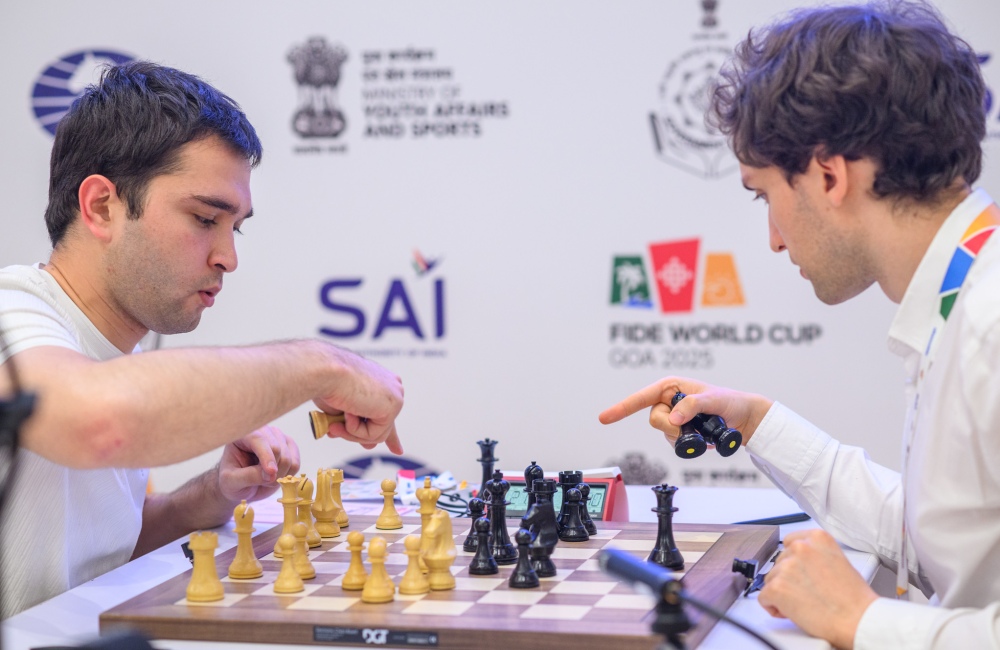
In the post-game interview, Yakubboev exuded confidence, not just about qualifying for the Candidates but going all the way to win the World Cup. Tomorrow he has the black pieces and will need only a draw against the German Grandmaster to seal his spot in the semi-finals. On paper, this task seems simple enough, but the stress brought on by the World Cup can drastically alter that at any point.
Javokhir Sindarov (2721) vs José Eduardo Martínez Alcántara (2644)
Jose Martinez has had an incredible World Cup run, eliminating multiple top players in his wake – Nodirbek Abdussatorov (2750), Alexey Sarana (2675), and most recently, Pentala Harikrishna (2690). His momentum has been fueled by confidence, incredible preparation, and belief that his current strength is much more than his rating suggests. I think few players in the field could match this ambition as much as his opponent today – Javokhir Sindarov, the 19-year-old Uzbek star who earned his title at the mere age of 12, and is just a handful of points away from becoming Uzbekistan’s number one – overtaking Nodirbek Abdussatorov.
A difference between the two, which could influence their approach to the classical segment, is their view of the faster time controls. Martinez thrives in the adrenaline of fast-paced chess, having even recently won Chess.com’s first edition of 3+0 Thursdays. Sindarov, on the other hand, had stated in his first interview with me that blitz is not his “type of chess”.
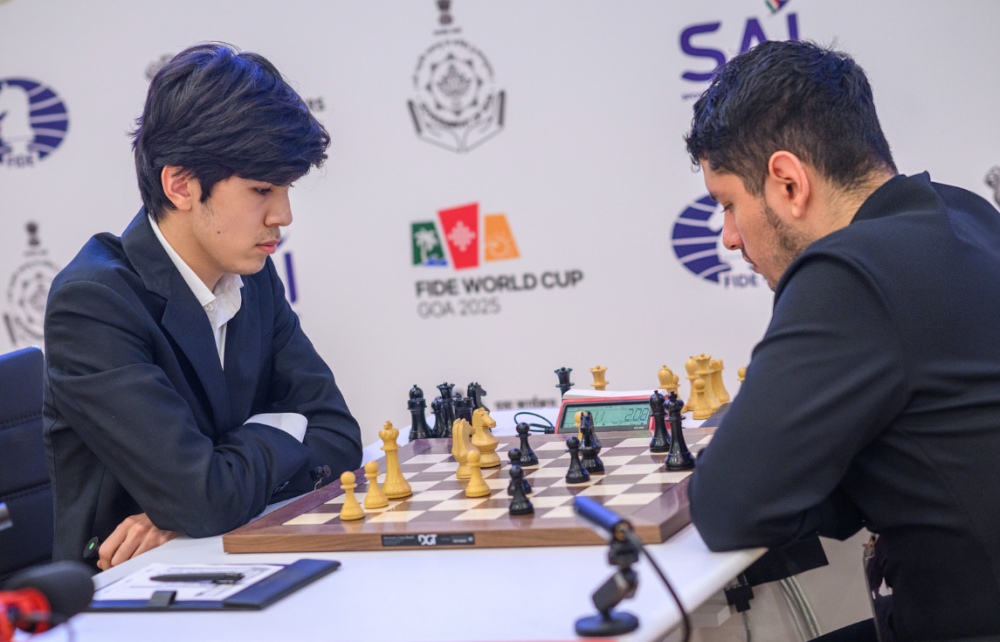
Their first encounter featured a Queen’s Gambit Accepted line that has historically favoured White. Both players appeared to be well versed until Sindarov, playing with the white pieces, offered an early queen trade, which got Jose thinking – a rare occurrence for the Peruvian-Mexican grandmaster in the opening stage. Perhaps a sign of leaving his preparation and knowledge of the position. Despite the queenless middlegame, there was still a lot of play for both sides. Martinez, who at some point seemed more passive with the black pieces, and all pieces tied to the 6th-8th ranks, finally managed to break through with some space and simplifications. The resulting endgame saw both sides with four pawns each, white two knights and black a knight and a bishop.
Then, a critical moment arose, when Martinez, with less than two minutes on his clock played incorrectly, giving White a chance:
Here, Black has just played 33…f5, leaving the h6-pawn hanging. Sindarov however opted for 34.Ne5 – a nice-looking move if there hadn’t been a free pawn to capture (albeit at the expense of a somewhat awkward knight trapped on the rim after 34.Nxh6 Bc8 35.g4 Kf8 36.b6 Kg7 37.g5). A few moves later, the game was drawn.
Wei Yi (2752) vs Arjun Erigaisi (2773)
The heavyweight clash of the round featured two of the tournament favorites, both world-class talents with an eye on qualification. The downside: only one will progress.
Both players arrived early at the board and looked relaxed. Their game followed a solid line of Closed Ruy López. Erigaisi, playing Black, blitzed out every single move and finished the entire game with more time on his clock than when he started – clear evidence of deep preparation. Both players showed perfect control: 99% accuracy, zero mistakes or inaccuracies, and a draw by repetition on move 31.
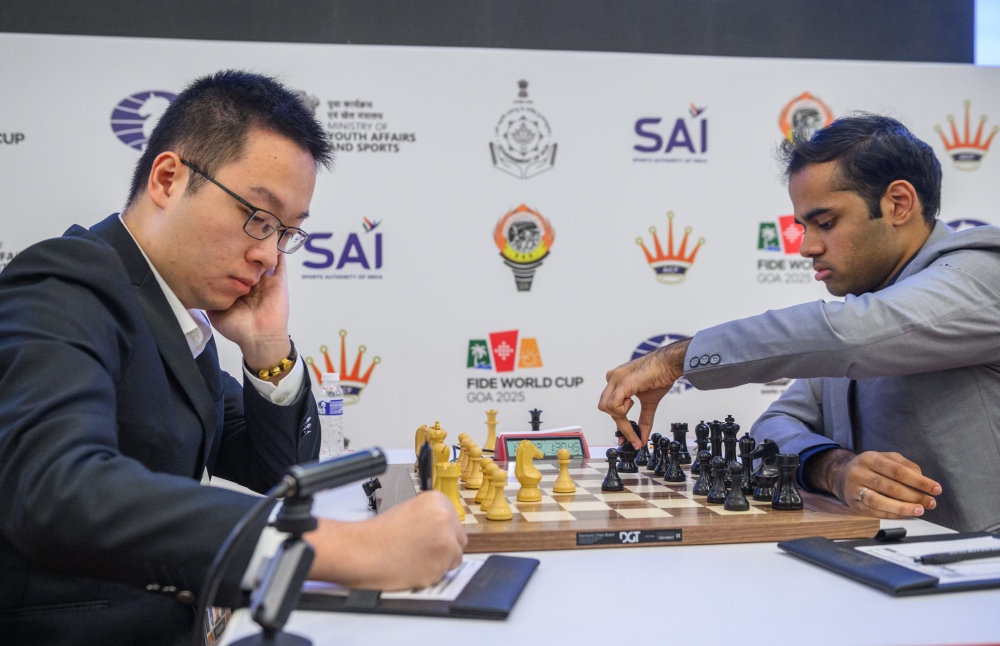
A quiet start, but as the commentators noted, this match has all the ingredients for a fierce fight in Game 2.
Sam Shankland (2654) vs Andrey Esipenko (2693)
Between them, these players have appeared in ten World Cups. Both had their best runs in 2021: Shankland reached the quarterfinals before losing to Karjakin, while Esipenko made it to Round 5, falling to Carlsen. That shared history of near-breakthrough makes this matchup especially compelling.
The exchange variation in the Queen’s Gambit Declined set the tone for a positional affair, following a game between none other than Magnus Carlsen and Ian Neponmiachtchi (2021) until Shankland veered them off the path on move 10. What followed was a balanced game in a Carlsbad pawn structure with practical play and manoeuvring from both sides. There was potential for sharpness, with Black pushing on the kingside and White on the queenside, but after some piece trades the tension dissolved. With no clear breakthroughs left, the players agreed to a draw in a dry four-rook endgame.
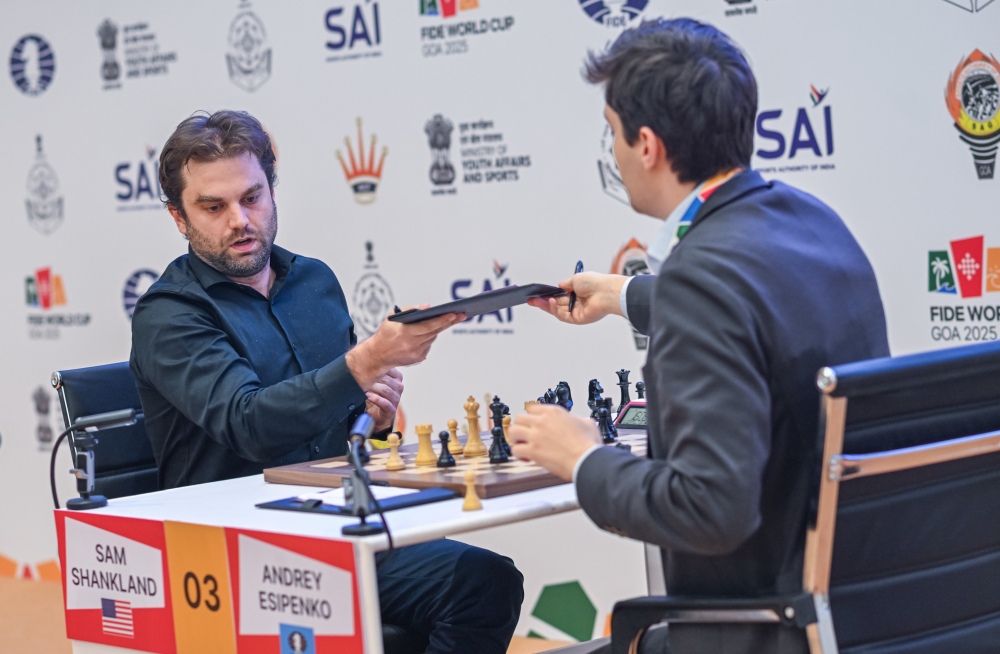
Game 2 of Round 6 will be played on November 18 at 3 PM local time.
The action can be followed live on the FIDE YouTube Channel, featuring expert commentary by GMs Jan Gustafsson and Peter Leko.
To watch the games in person, tickets can be purchased [HERE]
Written by WIM Charlize van Zyl (Goa, India)
Photos: Michal Walusza



